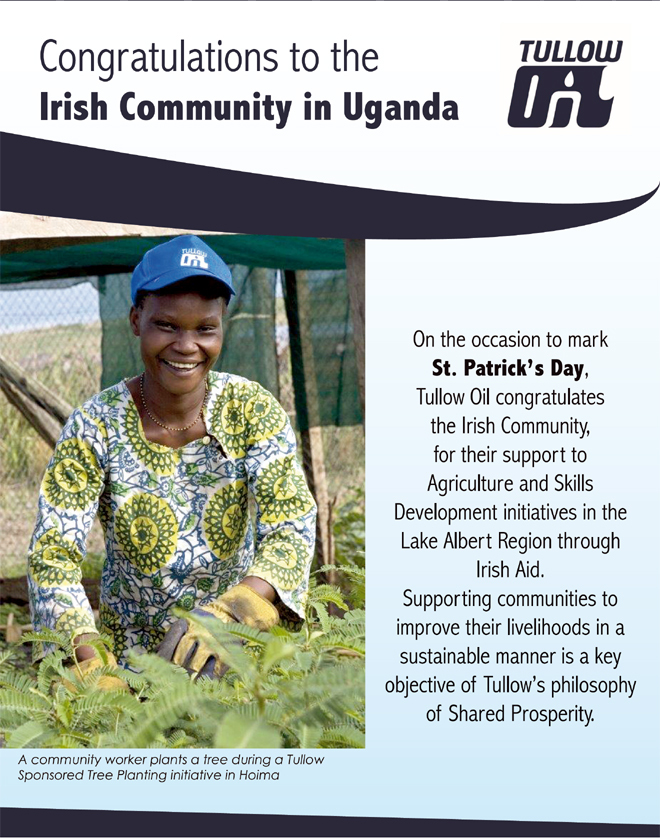Celebrating St. Partick's day
Message from Irish president: As we celebrate St. Patrick’s Day, we are reminded that our pa tron saint experienced hardship and migration
Message from Irish president
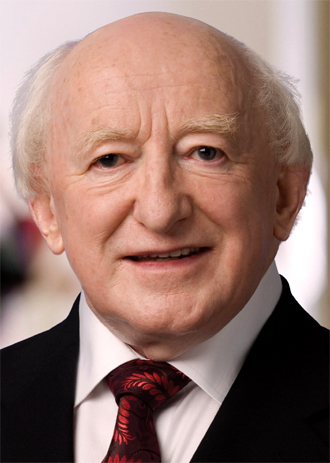 President Michael D. Higgins
President Michael D. HigginsAs Uachtarán na hÉireann/ President of Ireland, may I send you, and all those who are joining you in celebrating our national day, my warmest St Patrick's Day greetings.
It is a source of pride to all of us Irish that our national day is celebrated not just in Ireland, but in countless places around the world where members of the Irish global family have been able to make their homes.
Irish emigrants have been peerless ambassadors of our nation, spreading affection and enthusiasm for Irish culture all over the globe. As we celebrate St. Patrick's Day, we are reminded that our patron saint himself experienced hardship and migration.
Migration has remained a constant feature of the Irish experience, defining us as a people, and shaping our outlook on the world.
Since taking office, I have set out to visit many Irish communities abroad, to be given the opportunity to hear their experiences and to connect with their hopes and concerns.
Their passion, energy and commitment, and their great spirit of solidarity, reminds us of all that we can be proud of as a nation. Here at home, too, I meet so many impressive and inspiring groups and organisations who reflect the many threads that make up the multi-coloured tapestry of modern Ireland, and who are committed to crafting together a shared and better future.
To all those citizens, and to our friends celebrating the day with us: May I wish you a happy and enjoyable St. Patrick's Day 2017.
Beir beannacht.
Michael D. Higgins
Uachtarán na hÉireann
President of Ireland
ADVERTISER

Transforming communities through education
Irish Aid is one of Uganda's development partners supporting the transformation of the education sector. This support has been at almost every level of education, from primary through secondary, vocational training and postgraduate level.
From 2003 to 2015, Irish Aid provided Euros 38m (about sh145.2b) to the education sector.
This support targeted infrastructural improvements, curriculum reform and teacher education in the primary sector, as well as curriculum reform in secondary education. Irish Aid has a particular focus on the Karamoja sub-region, one of the most vulnerable parts of the country.
Irish Aid upgraded 11 secondary schools and two teacher training colleges in Karamoja under the Universal Post Primary Education and Training Programme at a cost of Euros 16m (about sh61.1b).
Irish Aid also provided over 2,317 bursaries for secondary education, with 1,750 beneficiaries from Karamoja sub-region and 567 from Acholi.
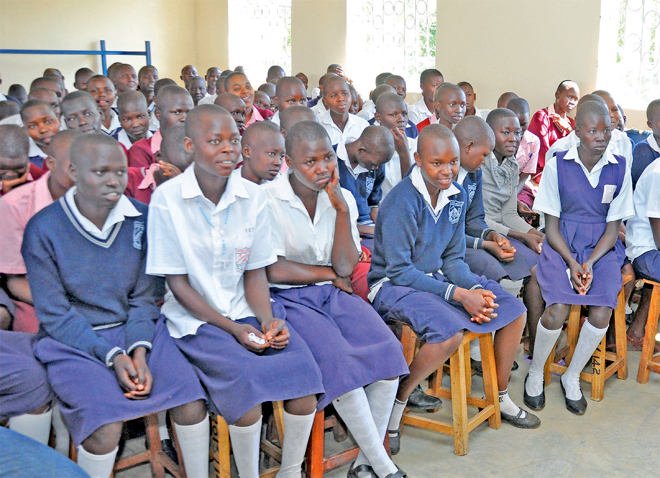 Students of Kangole Girls School, one of the beneficiaries of the Irish Aid development funds
Students of Kangole Girls School, one of the beneficiaries of the Irish Aid development funds
The bursaries covered tuition and scholastic materials, basic needs, transport to and from school, healthcare and psychosocial support. Most recently, Irish Aid built and rehabilitated 21 primary schools; three in each of the seven districts of Karamoja under the Karamoja Primary Education Programme at a cost of Euros 13.2m (about sh50.4b).
Under the Government of Ireland's new country plan for Uganda 2016-2020, Irish Aid will continue to support the education sector and continue its focus on Karamoja subregion.
Primary education
In partnership with UNICEF, Irish Aid is focusing on improving literacy and numeracy at lower primary level, while addressing other constraints to education in Karamoja such as school governance and violence against children.
Irish Aid will invest Euros 7.2m (about sh27.5b) over the period 2016-2020, which will include support to the gender unit within the Ministry of Education and Sports. CLICK HERE FOR MORE
ADVERTISER

Irish investments in Uganda
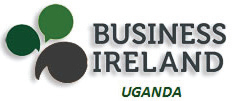
The opening up of the Irish economy in the last 50 years has transformed Ireland as a country beyond recognition. Over 1,300 foreign-owned companies have put down roots in Ireland, including nine of the top 10 global software companies. Irish food and drink is exported to over 175 markets around the world and Ireland welcomed nine million visitors last year.
Many factors contribute to Ireland's success. Among these factors is the role embassies, including its embassy in Uganda, play in supporting Irish investors and businesses in accessing new markets.
"The embassy has an important role to play in supporting trade and investment between Ireland and Uganda," the Irish ambassador to Uganda, Dónal Cronin, says.
"In fact, our new Country Strategy Paper for Uganda 2016-2020 which we are now implementing, includes trade and investment promotion as a priority area of work," he adds.
In order to boost business links between the two countries, an Irish business network was established in 2012. In 2017, the network is being re-launched as part of the Irish embassy's renewed efforts to promote Irish business and companies seeking to expand into the Ugandan market under a new strategy launched by the Irish government earlier this month.
The programme is called ‘Ireland Connect: Trading and Investing in a dynamic world'. Business Ireland Uganda (BIU) is one of only three business networks which the Irish government has set up in Africa to strengthen trade and investment ties between Ireland and Africa's high growth markets.
The other two networks are Business Ireland Kenya and Business Ireland South Africa. Frances Collins, the second secretary and trade advisor at the Irish Embassy, explains that:
"Business Ireland Uganda currently has 32 members; membership includes Irish citizens doing business in Uganda and Ugandan citizens with business ties to Ireland or Irish companies. The overall aim of Business Ireland Uganda is to share knowledge and experience on doing business in Uganda and engage on efforts to promote and facilitate Irish business in Uganda."
"One of the most important functions of the network is to provide opportunities for business people with common interests to interact and network. Through the network, members are able to identify opportunities to further their own businesses'' Cronin, who also serves as chairperson of the network, adds. CLICK HERE FOR MORE
ADVERTISER

Going neutral on carbon footprint
Today, we are aware of the negative effects of pollution to our environment more than we were a decade ago. In addition, climate change arguably now tops the debate on the international agenda because of its devastating effects on the environment.
One such impact is global warming, which refers to the expansion of the earth's normal surface temperature due to the effect of greenhouse gases such as carbon dioxide outfl ows from smoldering fossil fuels or from deforestation which trap heat that would naturally have escaped from earth.
Realising this, the world came together last year to ratify and sign the Paris Agreement, an accord within the United Nations Framework Convention on Climate Change (UNFCCC) dealing with greenhouse gas emissions, mitigation, adaptation, loss and damage, capacity building and finance.
In line with the spirit of the Paris Agreement, the Irish Embassy in Uganda is committed to mitigation of greenhouse gases through various initiatives including how, as an organisation, it can reduce its own carbon footprint.
Going Neutral
According to Tracy Kajumba, the regional climate change advisor with Irish Aid, Ireland's foreign policy for a sustainable world recognises the impact of climate change on weather, ecosystems and the adverse effects on the poorest people in least developed countries.
"Climate change targets set out in the Paris Agreement are global, but the actions are local. The Embassy of Ireland is engaging in the carbon neutral programme to contribute to the Government of Uganda's commitments on emission reductions while also contributing to the social economic development for the most vulnerable communities," she says.
The embassy participates in the Uganda Carbon Bureau's (UCB) Carbon Neutral programme. According to the Uganda Carbon Bureau, its "Going Neutral" service helps organisations to measure their carbon footprints (which is the amount of greenhouse gas they emit), and then supplies advice on steps to reduce this footprint by adopting energy use reduction measures, improving transport effi ciency, and the cutting down on wasteful practices. CLICK HERE FOR MORE
ADVERTISER

Uganda, Ireland share similarities in history - Cronin
The world stops on March 17 to celebrate St. Patrick's Day. He is Ireland's patron saint and created such an impact through his ministry in Ireland that the day is now synonymous with Irish culture. This year, the Irish Ambassador to Uganda, Dónal Cronin shares his thoughts on the day and other issues of bilateral concern between both countries with Umaru Kashaka and Miria Sidney
What are some of the enduring values which St Patrick espoused, which you think Ugandans would do well to emulate?
In my view, Uganda is already emulating Patrick. St Patrick was an immigrant originally from Wales who found himself forced to work in Ireland.
And he overcame those diffi cult conditions to become a leader and now our national saint with our national day named after him. Uganda has done a good job in receiving many refugees over the last number of years.
And I think there are lessons for us all, including in the European Union, in terms of Uganda's generosity in the way it has managed the refugee infl ow. St Patrick also taught peace and co-existence and the role that Uganda plays in regional peace and security is critical.
The mediation in Burundi, engagement in South Sudan and the peace-keeping force in Somalia are positive and necessary engagements by this Government which we wish to encourage to be sustained.
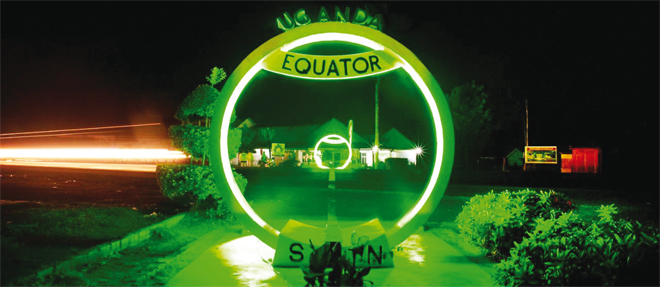 The equator monument in Uganda has been made green as part of Ireland's global campaign
The equator monument in Uganda has been made green as part of Ireland's global campaign
How have you found Uganda as a country?
Well, this is my second time in Uganda. I was here for almost seven years working in the Irish Embassy from 2003 to 2009.
Then I was fortunate enough to come back to Uganda in 2013 as Chargé d'Affaires and then ambassador, so Uganda for me and my family is more like our home.
We have enjoyed being in Uganda, working in Uganda and for me representing my country in Uganda.
And the partnerships that we have in Uganda with the Government, with other actors, our contacts, our people-to-people links between our two countries has made this an interesting and dynamic posting. CLICK HERE FOR MORE
ADVERTISER
